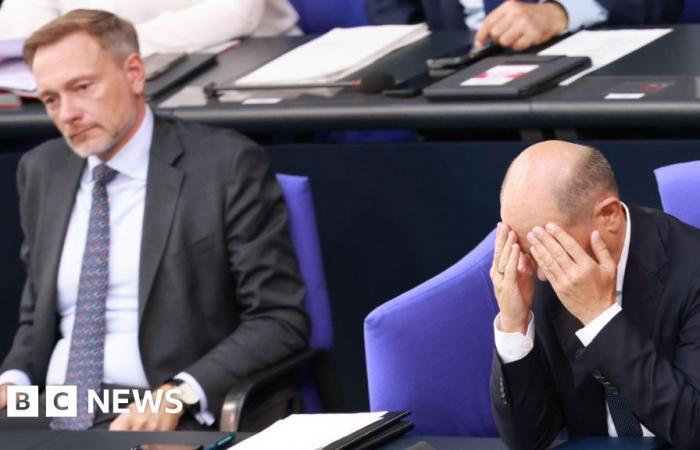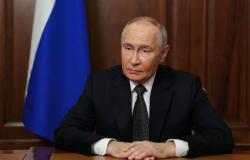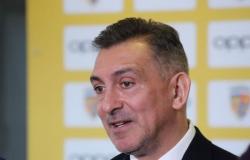 Shutterstock
ShutterstockGermany’s governing coalition has collapsed after Chancellor Olaf Scholz fired a key minister and said he would call a vote of confidence in his government early next year.
The chancellor said he had no trust in Finance Minister Christian Lindner, who heads the pro-business Free Democrats and has been part of the coalition along with Scholz’s Social Democrats and the Greens.
The crisis inside the coalition plunged Europe’s largest economy into political chaos, hours after Donald Trump’s US election victory triggered deep uncertainty about the future of the continent’s economy and security.
President Frank-Walter Steinmeier called for common sense to prevail.
“This is no time for tactics and squabbling, but for reason and responsibility,” he said.
The so-called “traffic-light” coalition has governed Germany since 2021 and its collapse means Scholz’s government no longer has a majority in parliament.
The confidence vote could lead to early elections by March, although the opposition says a confidence vote should come next week, not next year. Steinmeier said he was prepared to dissolve parliament and call early elections if the chancellor lost a vote.
Internal tensions had been bubbling for weeks before exploding into the open on Wednesday night. It was triggered by a row over the 2025 budget, with Germany now facing its second year without economic growth.
“This is not a good day for Germany and not a good day for Europe,” said Foreign Minister Annalena Baerbock of the Greens.
Olaf Scholz said his former finance minister had “betrayed my confidence” and had put the interests of his party base over those of the country.
He added that Germany needed to show it could be relied upon by other countries, particularly following Trump’s election success in the US.
Lindner, who leads the Free Democrats or FDP, accused Scholz of “leading Germany into a phase of uncertainty”. He had refused Scholz’s demand to loosen the spending limit known as a “debt brake” that requires German governments to balance the budget.
While two of his party colleagues also resigned from their cabinet posts, a third, Volker Wissing, said he had made a personal decision to stay on as transport minister and resign from his party.
The head of the conservative Christian Democrats, who are well ahead in opinion polls, said there was no time to wait. “We simply cannot afford to have a government without a majority in Germany for several months,” said Friedrich Merz.
 Reuters
ReutersThe so-called traffic-light coalition was formed after Scholz’s Social Democrats narrowly defeated the conservatives in federal elections in September 2021.
It was named after the individual red, yellow and green colours of three parties – Scholz’s centre-left, the economically liberal FDP and environmentalist Greens – who all planned to spend big on their own individual core interest groups.
However, Russia’s full-scale invasion of Ukraine in 2022 sent energy prices surging, and left Germany facing a increase in defence spending – and the cost of taking in 1.5 million Ukrainian refugees.
Scholz and his Green partners want to tackle this by loosening the debt brake to allow more spending. Lindner wanted to pay for tax cuts by slashing welfare and social budgets and pushing back environmental targets.
Economy Minister Robert Habeck of the Greens said the party would not quit the government and that its ministers would remain in office.
Scholz announced that a vote of confidence would be held in Germany’s parliament, the Bundestag, on 15 January.
If MPs vote down the government, the country will head for fresh elections within weeks, instead of the scheduled date in September.
However, the opposition could force Scholz out earlier if they can find a majority for an alternative chancellor.
For now, Scholz will head a minority government comprised of his Social Democrats and the Greens – the second-largest party in the coalition.
Without a parliamentary majority, Scholz’s coalition will need to cobble together support for individual votes from other parties in order to pass laws and measures.
Scholz said he would ask Friedrich Merz for support in passing budgetary measures to help Germany’s ailing economy and boost military spending.
Scholz has named Jörg Kukies as Christian Lindner’s replacement as finance minister.








